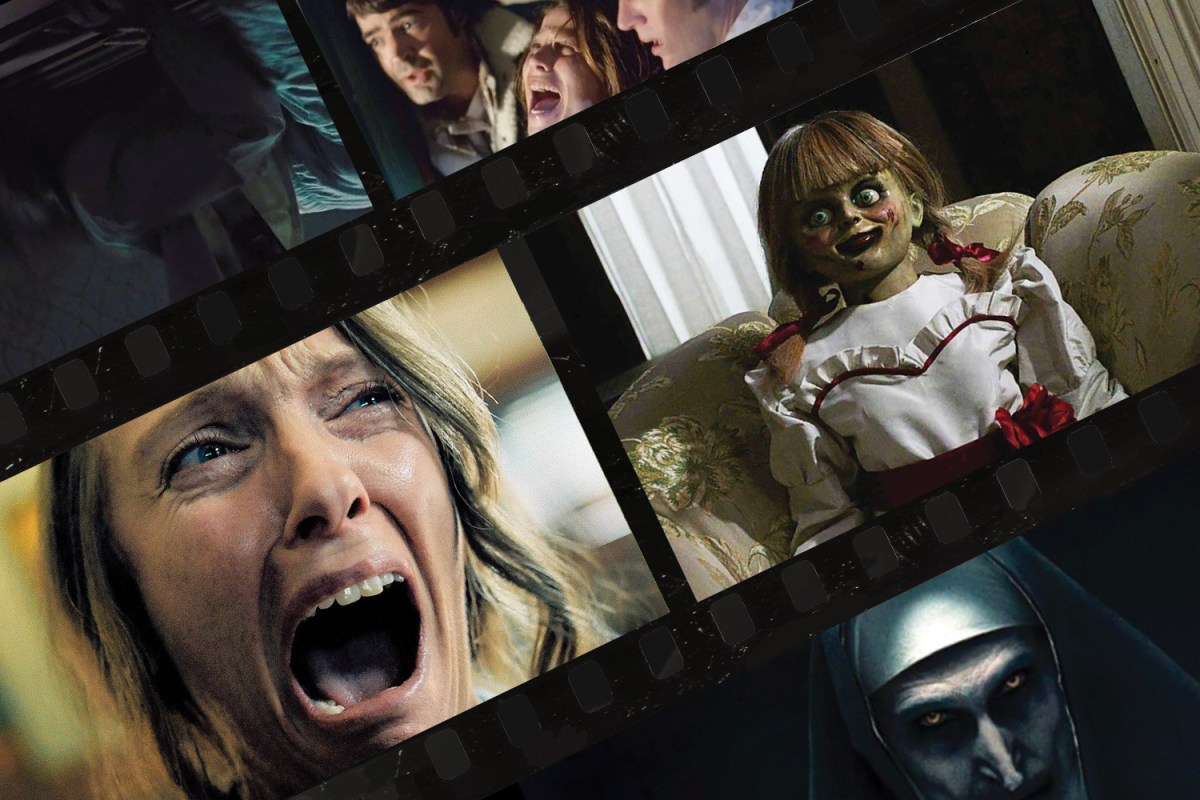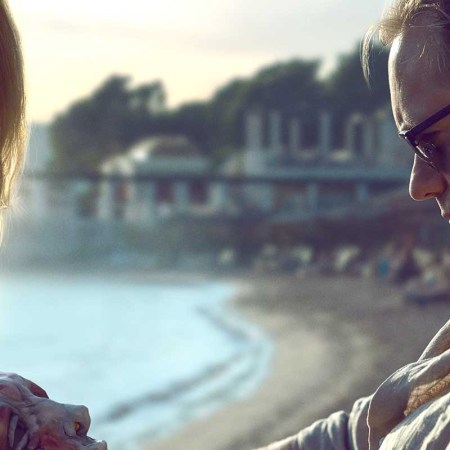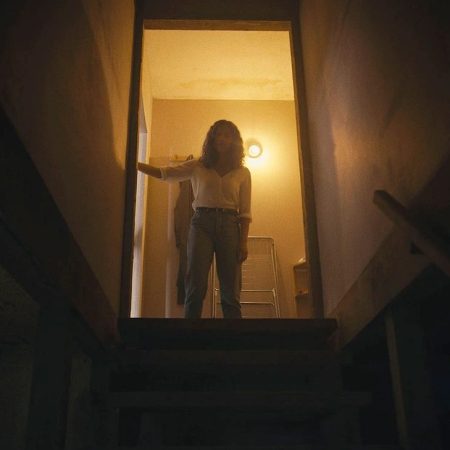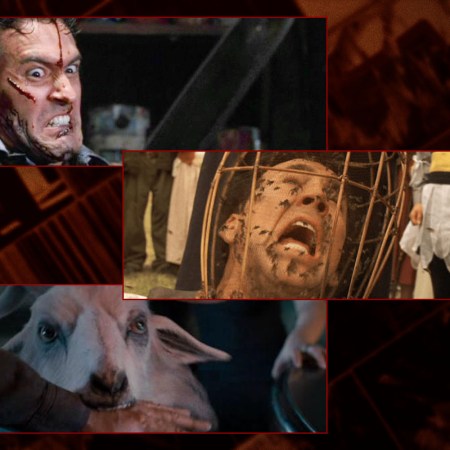“Sequences of disturbing violence and terror.” According to the MPAA, that’s what caught The Conjuring its R rating. It was enough to make a fright fan curious. A horror flick scoring an R was not exactly breaking news. But an R not for gore or language or sex but only for terror? How scary was this movie anyway?
Audiences got an answer 10 years ago last week, when James Wan’s loosely fact-based chiller crept onto the big screen. The Conjuring, ripped from the case files of paranormal investigators/probable frauds Ed and Lorraine Warren, turned out to be an elegantly orchestrated jump-scare symphony: a series of old-fashioned “boo!” moments, elevated by the director’s burgeoning talent for funhouse jolts, and by canny, exaggerated claims to based-on-a-true-story veracity. It was, in other words, a shivery good time at the movies — enough so to rack up big bucks, and to eventually spawn a whole shared universe of sequels.
Yet if you went to The Conjuring expecting some unprecedented gauntlet of fear, you might leave feeling a tad disappointed. At least that’s how I felt, walking out of a July advance screening at an AMC on the far west side of Chicago. Warner Bros., building on the pre-release buzz, handed out vials of holy water and brought a real priest to bless the superstitious and the spooked — a bit of William Castle huckerism for the Catholics in the room. The God-fearing theatrics positioned The Conjuring as the 21st-century heir apparent to The Exorcist, the ’70s horror phenomenon that soiled a whole generation’s loins. It was, all told, a rather effective way to build up anticipation for what we were about to watch. But how could this movie, or any other, live up to such hype?
Five years later, in 2018, another supernatural ghost story of a family tormented by unholy evil arrived in theaters, promising to bring a deathly chill to the summer movie season. Here, it was critics, not censors, spreading notice that something wicked that way came. Hereditary, an artfully nasty bit of occult nightmare fuel, had premiered months earlier to stricken reactions at the Sundance Film Festival. Its reputation preceded it. The word of mouth was that one’s own would twist into a scream.
“Grips you with real terror, the unspeakable kind,” one trailer promised. “Don’t say you weren’t warned” was the warning of another. It was The Conjuring all over again! Except this time, the hype was real. Or so I insisted. Those words, after all, were my own, written over a few hours in a Park City condominium, not far from where much of Hereditary was shot. They were my initial impressions — not so much a review as a testimonial, my attempt to get on paper the unique sensation of having a jackhammer put to my heart and nerves.
If The Conjuring had given me a few pleasurable shudders, Hereditary had cut me to the bone. I didn’t so much watch it as endure it, my palms wet with stress. That late-night Sundance screening was a once-in-a-lifetime viewing experience, the kind every horror fan pines for and dreads in equal measure. It was an unprecedented gauntlet of fear, at least for one critic shrinking into his seat. This was one of the few times in my moviegoing life where I felt a powerful, even primal urge to flee the theater.
Hereditary, like The Conjuring before it, would inspire comparisons to The Exorcist, but for different reasons. Though the supernatural threat here was similarly satanic, the vibe was less Sunday school sermon than harrowing therapy session. Ari Aster, the young visionary making his feature debut, had managed the same kind of genre alchemy William Friedkin pulled off in ’73, stitching a serious drama of family torment to a series of supreme multiplex shocks. That blend was right there in Toni Collette’s howling simulated agony, playing a mother caught in the twin crucibles of grief and fear.
“One of the most traumatically terrifying movies in ages,” I wrote, breathlessly. “Pure emotional terrorism,” I gushed. I meant every word. To this day, those four skimpy paragraphs remain one of the most widely read things I’ve ever written — and, via the sentiments A24 pull-quoted for the trailers, one of the few instances in which my early reaction to a movie got rolled into its whole campaign of carefully cultivated enticement.
“Beau Is Afraid” Is Ari Aster’s Dementedly Ambitious Look at Mommy Issues
Is the director simply having a laugh or baring the innermost contents of his private psyche?It wasn’t until Hereditary hit theaters in June that it occurred to me that the film might not have the same power over general audiences, or even other critics, that it exerted over me. What I began to detect, in conversations with friends and reviews, was something akin to what I felt walking out of The Conjuring five years earlier: the chill not of unfathomable terror but of nagging disappointment. “Maybe I just encountered too much ‘scariest movie ever’ hype,” a colleague later wrote, summing up the growing sentiment that a film sold as an all-time hair-and-knuckle whitener was nothing of the sort.
With dawning horror, I grasped my own role in building that hype. My voice was, of course, just one in the chorus of acclaim that greeted Hereditary at Sundance, where movies go for standing ovations rarely repeated in the wild of wide release. I’m not naive enough to believe that my own subjective take on a movie shaped its reputation or anything. But I still felt a certain guilty responsibility for building this film up in the minds of readers. It was the dark flip side of the satisfaction critics feel about playing cheerleader for something they love: What if your words get hopes too high for any film to reach?
I could, and still can, intellectually rationalize why Hereditary “works.” It has something to do with the way that Aster uses the shocking intensity of his heroine’s emotions — the tar-black resentment that starts oozing out of her at dinner tables and during bad dreams — to goose his big scares, rattling us with the bleak drama of his scenario to better assault us with the horror. It finds a missing link between anguish and fright.
Truthfully, though, I felt the movie in my gut more than my head. It triggered my pet phobia of freak accidents, like the one that arrives at the end of the first act, via a twist of such upsetting cruelty that every moment afterwards feels inherently unsafe. That date with the utility pole, and the frankly obscene sleepwalk of shocked underreaction that happens afterwards, grazed some private anxiety of hurting the people in my life, of being forced to grapple with the irreversible consequences of my carelessness, of inflicting harm that can’t be undone.
And in the volcanic eruptions of confessional contempt Collette’s Annie unleashes on her family, Hereditary touched on some bone-deep fear — some horrible certainty — that my nearest and dearest secretly couldn’t stand me. To that end, the most haunting scene in the movie is the one where Annie, tumbling through nightmares within nightmares, tells her son that he was an accident, a burden, an unwanted barnacle on her life. That‘s the unspeakable horror to which I referred.
Direct or implied, the promise of big scares is a double-edged machete. It will draw a crowd, but it might also put that crowd on the defensive. “Shake me to my core, or I want my money back!” is the mantra of horror’s hoi polloi, whose judgment can be harsh. Just ask the Blair Witch, pelted with proverbial vegetables by a nation that felt hoodwinked by the advance praise.
My Hereditary rave wasn’t hyperbolic. But it was inherently personal. Terror always is. And that’s the rub of selling any film on its fear factor alone: One person’s hair-raising ordeal is another’s no big deal.
It’s why, ultimately, The Conjuring jolted me but didn’t really get under my skin; a life of agnosticism left me immune to its religious dread, the way it preys on the devout. Truth be told, The Exorcist, maybe the consensus choice for Hollywood’s scariest achievement, doesn’t much bother me either, probably for the same reason. It’s always struck this nonbeliever as funnier than it is scary, presenting demonic possession as a night at the mercy of a vulgar insult comic, spewing obscenities and soup.
Of course, the element of surprise helps. I had the privilege of going into Hereditary blind, with no knowledge of what traumas awaited me — a privilege that any review, even one as spoiler-free as my own, denies the reader. By chronicling my own petrified journey through Aster’s story, I set the expectation that those reading would have a similar experience. And in a way, I fed a machine of hype that can guarantee a horror movie an audience but also set that audience up for inevitable letdown.
“Scariest movie ever” is a promise that can’t be kept, a target over a film, an invitation to ask what the fuss is all about. It’s a superlative destined to turn thrillers as effective as The Conjuring and Hereditary into double-dare challenges. And so utter those words with caution, even when they express the sincere depths of your own distress. No scary movie benefits from too much hype. Except for maybe The Texas Chain Saw Massacre. There’s no overselling that mad, petrifying thing.
This article appeared in an InsideHook newsletter. Sign up for free to get more on travel, wellness, style, drinking, and culture.

























